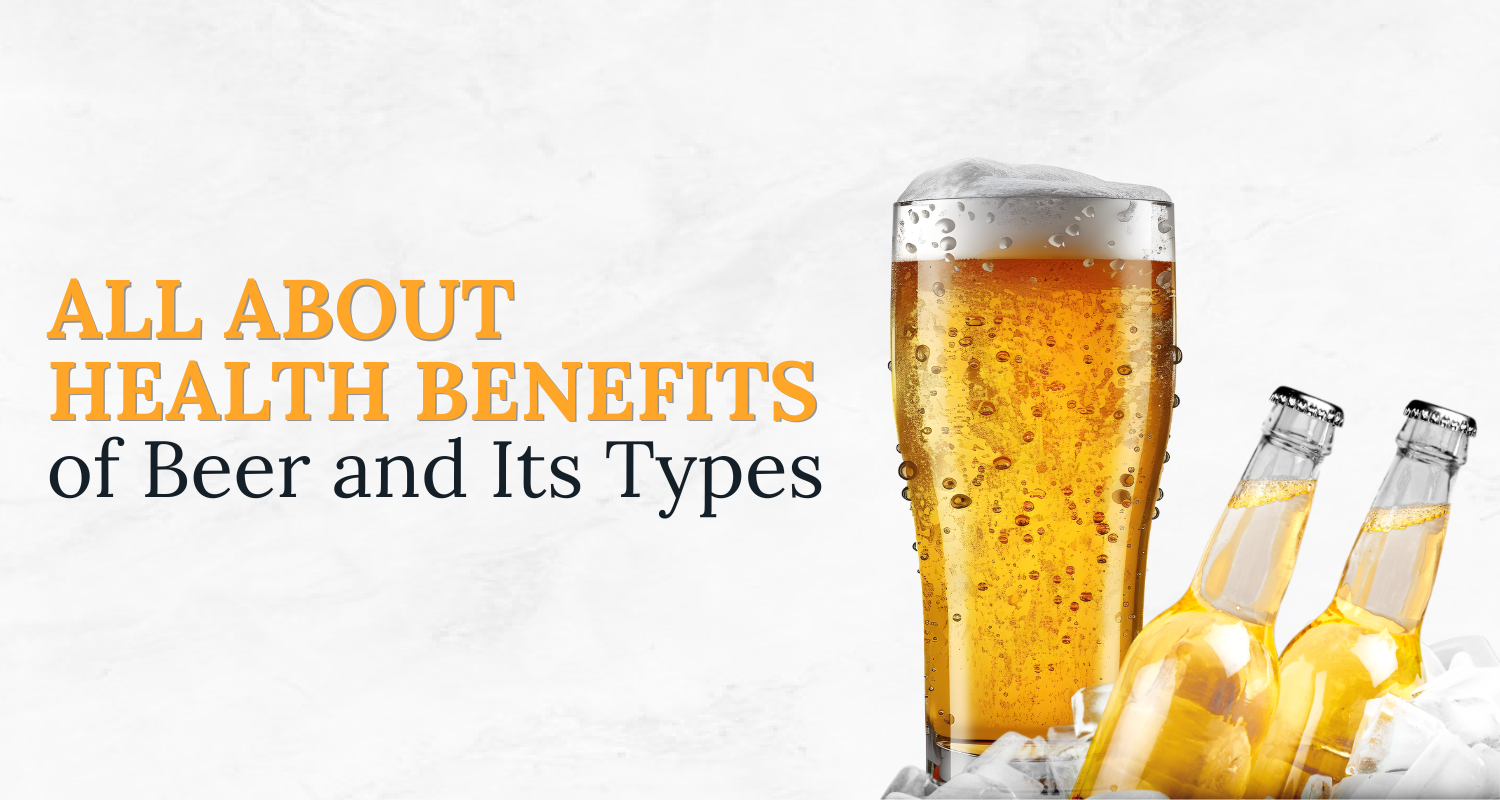All About Health Benefits of Beer and Its Types

Beer, the age-old beverage people worldwide have enjoyed for centuries, has a secret beyond its enthusiasm and taste. It might surprise you to learn that, when consumed in moderation, beer can offer a range of intriguing health benefits.
Beyond being a refreshing way to unwind, beer could potentially become a source of well-being for those who enjoy it sensibly. In this blog, we’ll explore the surprising health benefits of beer, along with a few side effects you should be aware of.
Different Types of Beer
When it is about enjoying a cool beer, the options appear to be unlimited. There is a beer out there for everyone, regardless of your preference for strong tastes like stouts and porters or crisp, light lagers.
These are only a few of the many varieties of beers that are now on offer:
- Lagers: Light in color and smooth and crisp in flavor, lagers are a popular beer choice. They are a popular option for casual beer consumers since they are brewed at lower temperatures and are usually simple to drink.
- Pale Ale: Ales come in a wide range of colors and strengths and are renowned for their fruity, sometimes spicy tastes. The ale category offers a broad variety of selections, ranging from porters and stouts to Pale ale beers.
- IPAs: India In recent years, Pale Ale, or IPAs, have grown in popularity. Craft beer aficionados often appreciate these brews because of their intense hop taste.
- Wheat beers: A significant amount of wheat is added to regular barley during brewing to give wheat beers a lighter, more refreshing flavor. They are a terrific option for hot summer days and often contain citrus undertones.
- Stouts and porters: These extremely dark and rich beers are noted for their strong tastes and smooth, velvety textures. They have a unique coffee or chocolate flavor since they are often brewed with roasted malt.
- Sours: Sour beers have an acidic and tangy taste because they are brewed with wild bacteria and yeast. However, many beer enthusiasts find them an acquired pallet item; many like their complexity and distinctive flavor characteristics.
What Are The Benefits of Consuming Beer?
Beer has been consumed by people globally, and its taste is not the only thing that makes it best; its moderate consumption has several health benefits.
Let us now explore some of the health benefits beer usually offers.
1. Heart Health and Beer
One of the most intriguing benefits of moderate beer consumption is its potential to promote heart health. Various studies have suggested that light to moderate beer consumption may be associated with a reduced risk of heart disease. It can be on par with the benefits attributed to wine.
A 12-week study found that moderate beer intake, one drink per day for women and men can have two drinks per day, improved the antioxidant properties of HDL (good) cholesterol and the body’s ability to remove cholesterol.
2. Blood Sugar Control and Beer
A light to moderate beer consumption might be welcome news for those concerned about blood sugar control. Several studies have shown that it can reduce insulin resistance, a prime risk factor for diabetes, and lower the overall risk of developing type 2 diabetes.
A large study of about 70,500 participants associated moderate beer intake with significantly reducing diabetes risk. However, it’s essential to note that this benefit is primarily linked to beers with lower sugar content.
3. Beer and Stronger Bones
Despite being non-alcoholic, ginger ale is often associated with soothing digestive issues. But if you’re looking for stronger bones, you might want to opt for beer instead.
Low to moderate beer intake has been linked to enhanced bone density, which can be particularly beneficial for men and postmenopausal women. The beer minerals derived from cereal grains and yeast contribute to this surprising advantage.
4. Beer Can Cure Insomnia
An ideal nightcap is a beer. Beers like lagers, stouts, and ales have been shown to increase dopamine synthesis in the brain—a substance doctors may recommend to patients with sleeplessness.
Researchers have shown that the mere taste of beer raises dopamine levels in the brain, promoting calmness and relaxation in those who consume it.
However, The researchers clarified that these health benefits of beer are felt after only a taste and that all you need is a meager 15-milliliter amount, or the equivalent of one tablespoon of beer.
5. Beer and Post-Workout Hydration
If you’ve ever contemplated having a cold beer after a workout, some evidence suggests that it might not be the worst idea. Some studies indicate that drinking a low-alcohol beer with electrolytes can improve rehydration.
However, it’s essential to consider that excessive alcohol consumption can hinder muscle growth and recovery. To rehydrate more effectively, non-alcoholic electrolyte beverages are likely your best bet.
6. Beer Reduces the Risk of Alzheimer’s
One of the finest health benefits of beer is that it can decrease the risk of cognitive decline, Alzheimer’s disease, and other types of dementia.
Though the numbers speak for themselves—more than 365,000 adults were questioned in one study—it is still unclear why moderate drinking may be advantageous. According to one idea, moderate alcohol use has well-known cardiovascular advantages, such as increasing good cholesterol, and may also enhance brain blood flow and metabolism.
Beer’s silicon concentration may be to blame. It is believed that silicon shields the brain from the damaging effects of aluminum in the body, which is one of the potential causes of Alzheimer’s disease.
7. Beer Can Stop Cataracts
Drinking too much beer may cause blurriness in your vision, but the ideal quantity will help your eyes. The antioxidants in beer, especially in ales and stouts, have been shown by scientists at the University of Western Ontario to protect against damage to the mitochondria.
Cataracts result when the outer lens of the eye sustains damage to its mitochondria, which are components of a cell that are accountable for turning glucose into energy. Because antioxidants guard the mitochondria against this harm, the study’s authors advise consuming one alcoholic beverage daily to avoid seeing an eye doctor.
Suggested Limits for Men and Women
The suggested moderate alcohol consumption levels for men & women are not well known. To preserve good health and stay away from the dangers of binge drinking, it’s essential to be aware of these limitations.
It is advised that males have no more than two alcoholic drinks each day. This covers all alcoholic beverages, including wine, liquor, and beer. Overdoing it may raise your chance of health problems; these include high blood pressure, liver disease, and certain forms of cancer.
The suggested daily limit for women is much lower: no more than one drink. Women’s bodies handle alcohol differently than men’s, and they are often lighter and smaller than males. This implies that individuals are more vulnerable to alcohol’s harmful effects, including damage to the liver and a higher chance of breast cancer.
Conclusion
Beer isn’t just for raising a toast. Beer has some potential health benefits when consumed in moderation. From promoting heart health to potentially reducing the risk of diabetes and dementia, moderate consumption of beer has perks.
However, it’s essential to be mindful of the side effects associated with excessive or binge drinking. Remember that the health benefits of beer can be achieved with a good and balanced diet filled with multiple whole foods like fruits and vegetables.
So, while it’s OK to enjoy a beer now and then, it’s crucial to do so in moderation & make informed choices based on your health goals. Cheers to your health!
Health Benefits of Beer – Frequently Asked Questions (FAQs)
What Type of Beer Has the Most Health Benefits?
Because sour beers are made using various methods, they contain diverse antioxidant components. Thus, lambics are not only more healthful than many beers, but they are also healthier. Stouts and porters often contain the greatest content and activity of antioxidants among all beer genres.
Is Beer a Healthy Alcohol?
Beer consumption has conflicting health consequences. While moderate drinking may have health advantages, binge drinking or excessive drinking is linked to detrimental health outcomes. Among these are higher chances of alcoholism, despair, hepatitis, gaining weight, cancer, and passing away.
Can Beer Expire and Is It Safe to Drink?
Yes, but with time, its taste will deteriorate. Because the chemical ingredients that give beer its distinctive flavor and aroma are broken down by heat, light, and air, beer is an unstable product that stains easily. However, it may still be entirely safe to consume even after its taste is fading. Here’s all the information you need.
How Do I Know if Beer Is Bad?
Beyond its best, some beers taste like “wet cardboard,” while others may become too sweet. And then there’s the dreaded skunkiness—a flavor familiar to anybody who’s ever let a beer sit out in the hot sun for too long.
How Long Is Unopened Beer Good For?
If you cannot measure the temperature, you may store the unopened beer in the refrigerator for eight months. During this time, it will maintain its optimal quality. Additionally, unopened cans and bottles can be stored at room temperature for six months, during which time they will maintain their optimum quality.
Is Beer Good Daily?
Consuming 650 cc of beer daily is typically unhealthy. While occasional and moderate alcohol use may offer some health advantages, frequent and excessive beer intake may cause several health problems.
What Is the Disadvantage of Beer?
Increased alcohol consumption in beer may lead to major issues such as low blood sugar, sleepiness, vomiting, and blackouts. Long-term heavy beer consumption may lead to a number of major health issues, such as liver issues, dependency, and several forms of cancer.
Disclaimer: This content, including advice, provides generic information only. It is not a substitute for a qualified medical opinion. Always consult a specialist or your own doctor for more information. Ingredient Fact does not claim responsibility for this information.






